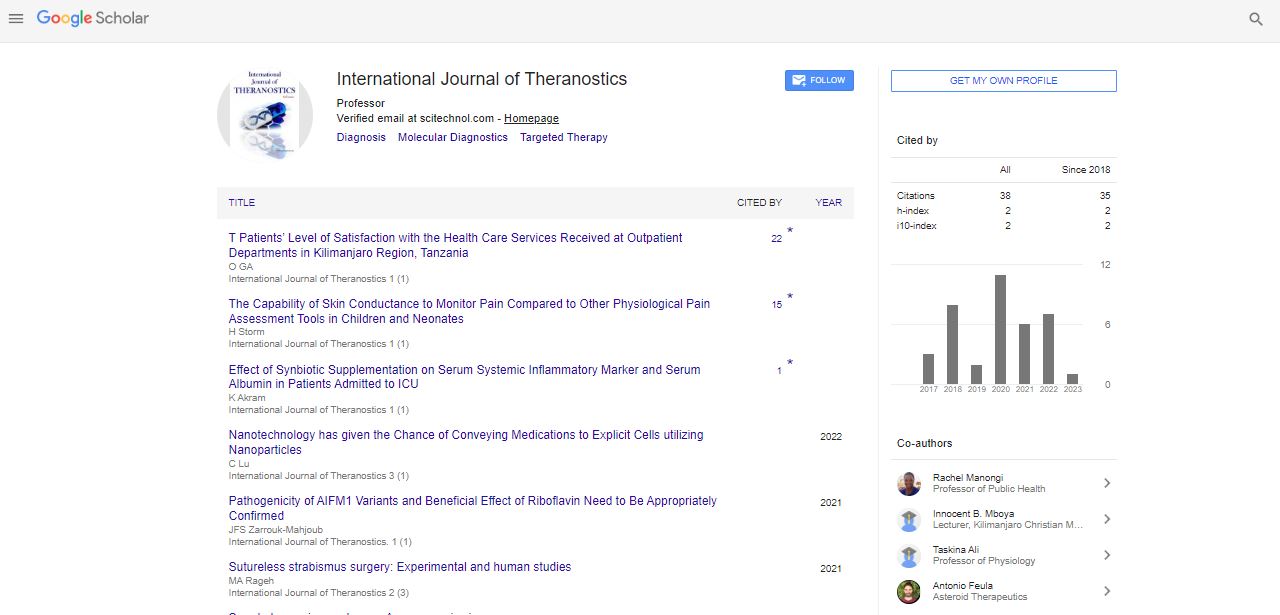Commentary, Int J Theranostic Vol: 12 Issue: 1
An Overview on Pharmacodiagnostic and its Treatment Methods
Margaret Frame*
1Department of Medicine, University of Edinburgh, Edinburgh, UK
*Corresponding Author: Margaret Frame
Department of Medicine, University of
Edinburgh, Edinburgh, UK
E-mail: framemargaret@ac.uk
Received date: 03-Feb-2023, Manuscript No. IJT-23-95529;
Editor assigned date: 06-Feb-2023, PreQC No. IJT-23-95529 (PQ);
Reviewed date: 20-Feb-2023, QC No IJT-23-95529;
Revised date: 27-Feb-2023, Manuscript No. IJT-23-95529 (R);
Published date: 07-Mar-2023 DOI: 10.4172/IJT.100120.
Citation: Frame M (2023) An Overview on Pharmacodiagnostic and its Treatment Methods. Int J Theranostic 12:1.
Keywords: Diagnosis, Image-guided Therapy, Molecular Diagnostics
Description
Pharmacodiagnostics is the use of diagnostic tests to identify specific patient characteristics or genetic markers that may affect how they respond to certain medications. By identifying these markers, doctors can personalize medication therapy to better suit the individual needs of each patient. This can improve patient outcomes and reduce the risk of adverse reactions or medication interactions.
Pharmacodiagnostics involves the use of a variety of tools and techniques, including genetic testing, imaging, and laboratory tests. These tests can help doctors identify patients who may be at higher risk for adverse drug reactions or who may require different dosages or types of medications than other patients with similar medical conditions.
One of the key benefits of pharmacodiagnostics is its ability to help doctors avoid trial-and-error medication therapy. Rather than prescribing a medication and waiting to see if it is effective or causes adverse reactions, doctors can use pharmacodiagnostics to select the most appropriate medication for a patient based on their individual characteristics and medical history.
Pharmacodiagnostics can also be used to identify patients who may be at risk for drug interactions. Certain genetic markers can affect how the body metabolizes certain medications, which can increase the risk of adverse reactions or medication interactions. By identifying these markers, doctors can adjust medication therapy to reduce the risk of these interactions.
Another benefit of pharmacodiagnostics is its potential to improve patient adherence to medication therapy. When patients receive medications that are tailored to their individual needs and characteristics, they may be more likely to take their medications as prescribed. This can improve patient outcomes and reduce the risk of complications or hospitalizations.
Pharmacodiagnostics can also help to reduce healthcare costs by reducing the need for trial-and-error medication therapy, which can be expensive and time-consuming. By selecting the most appropriate medication for a patient based on their individual characteristics and medical history, doctors can reduce the number of medications that a patient needs to take and improve the effectiveness of their medication therapy.
Drug diagnostics are particularly useful in the treatment of cancer. By identifying certain genetic markers or characteristics of a patient's cancer cells, doctors can select drugs that are likely to be most effective in treating that particular type of cancer. This improves patient outcomes and reduces the risk of complications and side effects. It also helps to treat infections.
However, pharmacodiagnostics also has some limitations. Genetic testing and other diagnostic tests can be expensive and timeconsuming, which can limit their use in certain settings. In addition, pharmacodiagnostics may not be appropriate for all patients or medical conditions. It is important for doctors to carefully consider the risks and benefits of pharmacodiagnostics in each individual case.
Pharmacodiagnostics is a powerful tool for improving medication therapy and patient outcomes. By identifying specific patient characteristics or genetic markers, doctors can personalize medication therapy to better suit the individual needs of each patient. However, pharmacodiagnostics is not appropriate for all patients or medical conditions, and its use should be carefully considered on a case-bycase basis.
 Spanish
Spanish  Chinese
Chinese  Russian
Russian  German
German  French
French  Japanese
Japanese  Portuguese
Portuguese  Hindi
Hindi 